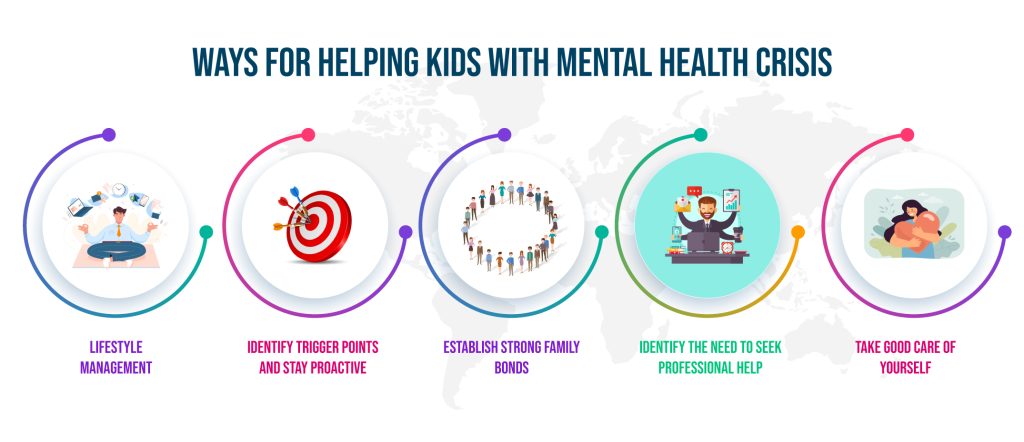Mental health issues are one of the most neglected health problems in the world. These issues have further aggravated post the pandemic. And in case of children, mental health problems have multiplied in the past couple of years.
A survey reveals that the pandemic took a toll on the mental health of children. 71% of the survey respondents (parents) agreed with this fact. This duration created a sense of unhappiness and deepened depression in children. And the spike in the cases of mental health-related emergencies also increased by 24% (between the age groups of 5 to 11 years).
It is clear that the pandemic stressors have deepened the mental health crisis in children. Hence, parents/caregivers/guardians need a better knowledge of mental health assistance to support their children in this post-pandemic world.
Here’s a look at the ways of helping kids with these issues:

1. Lifestyle Management
Managing lifestyle is essential to enjoy sound mental and physical health. However, post the pandemic, it is now even more critical to monitor your child’s lifestyle to keep physical and mental health issues at bay. Most kids attend online classes (either through online schools or regular institutions) and have more sedentary lifestyles because of this change in their study patterns.
All these changes need to be balanced with more physical activities to ensure that the child stays happy and physically active throughout the day. Following a good schedule and taking time for exercise, yoga, cycling, swimming, dance etc. can help you strike the right balance. You can also make use of mindful stress-relieving activities like meditation or engage children in aerobics, etc. to add the dimensions of physical activity.
All this should be supplemented with a balanced diet. So make sure that your kid eats right to avoid habits of extra munching throughout the day. Gadget-free family meal times and healthy snacking are ideal to build strong bonds and good relationships within the family unit. So make sure you plan the days of the week in advance and see to it that there’s enough time devoted to activities in your planner.
2. Identify trigger points and stay proactive
As parents, we must know about the topics/issues or situations that can upset our kids. Always try to keep your child’s stress levels under check by identifying and avoiding all that can act as a trigger for the child. For instance, a child with the memories of a traumatic event (like losing a parent or harassment, etc.) can experience stress once reminded of the incident.
Try to build your child’s mental strength by avoiding direct interactions that can bring back harsh memories. At the same time, try to build resilience skills in your kids to help him/her combat difficult situations in life. Teach them how to manage their stress with mindful activities. This will reduce your kid’s stress levels. And He /She will learn to deal with difficult situations in life.
3. Establish strong family bonds
Our kids need our unconditional love. And as parents, we are always up for it. While we put lots of effort raising our kids. However, many of us do not pay much attention to our family environment and interpersonal bonding.
Strengthening relationships can support our child’s mental health in a number of ways. It is a wonderful way of helping them combat the general stress of everyday life. And good relationships also help children feel a sense of security. Because they know that they have family members to fall back upon in times of need.
The best way of building trust and relationships in your family is to set aside family time. This will make your family environment cordial even with hectic work schedules and professional commitments. You can also plan a couple of getaways to nearby destinations as and when you find time for it. So invest in good family life and show your kids how much you care for them.
Good mental health helps in developing satisfying relationships. So help your child in all the possible ways to enjoy lasting relationships throughout life.
4. Identify the need to seek professional help
In the past couple of years, the pandemic has created a long-term impact on the mental health of children and adolescents. This highlights the need for prevention, and treatment to support the mental health of our kids.
Keep a check on your child’s behavior and if you find any constant warning signs (despite following the right strategies) do not wait any longer to discuss it with a practitioner. Remember that the nature of the problem might or might not be a serious threat to your child. But if you choose to ignore any warning sign, this neglect might land you and the child in bigger trouble. A child can have hidden anxieties, and insecurities that he/she might not discuss with the family in open. All this can be handled well by a trained practitioner. So do seek assistance if your child needs any.
5. Take good care of yourself
Do you know that there is a direct connection between a parent’s mental health and that of the child?
YES !!
Most of us ignore our own mental health in the hustle-bustle of meeting the ends. This has an adverse effect on the mental health of our kid. Because the mental conditions of parents hampers the child’s holistic development. By taking care of yourself, you can safeguard the child from these threats. So never ignore your mental health and immune your child from the threats of these issues.
Final Thoughts
Despite the challenges of the post-pandemic complex world, we are fortunate to have solutions to a number of problems related to mental health. With the growing awareness about mental health issues, you can now find help easily.
Besides, in recent times, there are also credible alternatives that have resolved issues like school violence. You can choose an accredited online school and keep your child under your constant vigilance if you notice any issues related to his/her mental health. This will help you to develop a better bonding with the child. And he/she will learn better in a happy and threat-free environment.




